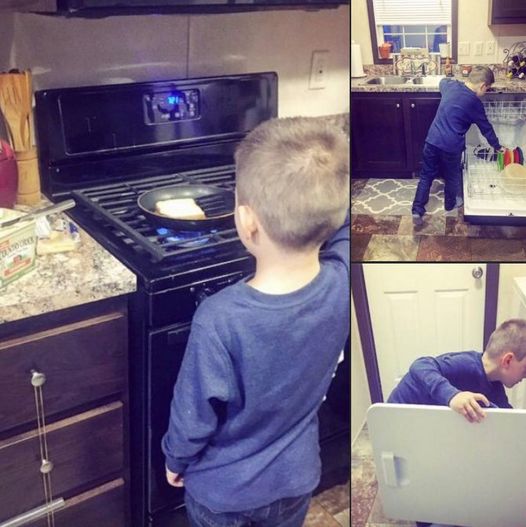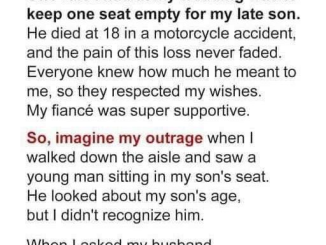
How we choose to raise our children and the lessons we decide to ingrain in them from an early age differs from parent to parent.
It’s only natural, of course. Some mothers and fathers take a more disciplined approach, for example, while others prefer to let their kids go through a try and fail cycle so that they can learn right and wrong through their own experiences.
Now, for the most part, how one chooses to style their son or daughter’s upbringing is their business, no one else’s. Yet that doesn’t stop people commenting and criticizing online every time a debate is sparked over some parental decision or another…
I remember when I was younger, doing chores was considered part and parcel of everyday life. I mean for me and my siblings, of course, not only my mother.
Doing dishes, making beds, helping to prepare food before mealtimes… the list goes on and on.
I understand times change, but in my mind getting children to help out with tasks around the house – providing there’s no danger involved – is a great way to instill values and a worth ethic that will come in handy later on.

It seems, though, that not everyone agrees. According to reports, one mother found this out the hard way a few years back after she uploaded pictures of her son and shared her method of giving him chores to do with the internet.
The mom in question, 22-year-old Nikkole Paulun, reportedly explained how she proudly put her 7-year-old son, Lyle, to work around the house, where he would help out with things like cooking and cleaning.
Nothing too dramatic, I’m sure we can all agree, but that didn’t stop online detractors from verbally attacking her and expressing concern over the potential impact on the child’s emotional well-being.
The bulk of the critics targeted the fact that the mother had shared her son’s chores online, not only potentially making other parents question themselves, but also flagging the idea that the child might not want to have his daily activities shared with a large number of strangers online.
One woman went as far as to write in the comments that Nikkole couldn’t just let her child “be your slave. Or to do the chores that you yourself don’t want to do.”
Another wrote: “So I take it you can do everything ur teaching ur son to do or are you just putting pressure on ur child?”
A third added: “Don’t get me wrong… a child should know responsibility. .. but should not be operating a stove that young.“
A fourth wrote: “Lazy mother’s are sweeping the country. It’s good to teach them while they’re young but i notice alot of these single mom’s are just raising their boy’s to be the man that they wish they always had.“
There were many who defended Nikkole in the comments, too, with her post gaining viral status after it garnered over 8,000 comments and 156,000 interactions on Facebook.
Nikkole herself insisted that she enjoys doing housework and that her son Lyle “just helps along the way & earns allowance as well.
What’s more, she added that her then-one-year-old daughter, Ellie, would be following in her elder siblings steps and doing the same thing when she was a little older.
What do you think to Nikkole’s parenting approach and the criticism she got for it? Let us know your thoughts in the comments box.
Lassie’s little Timmy reveals the secrets of TV’s most famous dog
For nearly two decades most of us can remember tuning in to see the latest adventures of the most famous dog on TV – Lassie.
This much-loved Rough Collie dog and her human companions graced our screens for 17 seasons from 1954 to 1973 and even made the transition from black and white to color in the ’60s.
But who could forget the adorable little boy who joined the show in its fourth season when he and his family adopted Lassie – 7-year-old Timmy Martin.

Now Jon Provost, who played Timmy, has celebrated his 74th birthday and shares the joy he had filming with his four-legged friend and how he was discovered by Hollywood at just 3 years old.
The Los Angeles-born actor said when he was 3 years old he was taken to an audition for a Jane Wyman movie because his mom was a huge fan and hoped to get her autograph. But, out of the 200 kids auditioning for the part, Jon got it.
It was far from evident that Jon would become an actor. His father worked with something completely different – he was an aeronautical engineer.
”My parents weren’t Hollywood people. My father is from Alabama and my mother is from Texas,” Jon said.

At age 4, he landed a role in a Grace Kelly and Bing Crosby movie.
“I didn’t have an agent. I got one and that led to more movies like The Country Girl with Bing Crosby and Grace Kelly. I did about 12 movies before I started ‘Lassie’”, he told Fox News.
Three different Lassies
Recalling the bonds he formed with the three different male dogs that played the part of the female Lassie, Jon said he developed the biggest bond with the last dog to play Lassie.

“I did the show for seven years, 249 half-hour episodes. I worked with three different Lassies. The last dog I worked with, I worked with him for five years alone,” he told Fox News.
“We grew up together. For five years, we saw each other five days a week and sometimes on weekends.
Revealing how well behaved the dog was he added: “The actors made more mistakes than the dog. They were more of a problem,” he laughed.

After leaving the show at 14 years old he starred alongside the likes of Natalie Wood and Kurt Russell and never fell into the Hollywood child actor trap saying: “My parents let me pretty much do what I wanted to do. I didn’t have to take a job.
“When I left Hollywood, I thought it was good that I did.”

Today Jon lives out of the limelight in Northern California but still gets fan mail from his time in “Lassie”. In 1994, the actor received a star on the Hollywood Walk of Fame.
Meanwhile, Lassie, the canine character, became so popular that she even had a “Lassie” riveting radio series.
Jon Provost wife
In 1979, Jon Provost tied the knot with Sandy Goosens. Together, they had two children, Ryan and Katie.
After being married for 14 years, the two divorced on December 20, 1993.
In 1999, Jon Provost found love again when he married Laurie Jacobson, a well-known researcher, and author.
I was such a fan of the adventures this sweet duo got up to. And with a moral to every episode, it was the perfect show for kids.
Please share with all the “Lassie” fans you know.



Leave a Reply